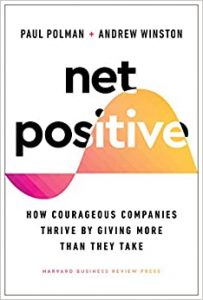
The notion that companies should “do no harm” made its way into the mainstream when Yvonne Chouinard, founder and owner of Patagonia, made it his battle cry, building one of the most successful and loved outdoor apparel companies in the process. Today many other businesses have joined the race, seeing the virtue – and potential profits – in “sustainability” and solving the world’s problems rather than adding to them.
“A Net Positive business increases the well-being of everyone it impacts and profits by solving the world’s problems, not contributing to them,” says Andrew Winston, whose most recent bestselling book, co-written with former Unilever CEO Paul Polman, looks at how to create a company that serves both its stakeholders and the rest of the world. A win-win formula for people, planet and profits.
What inspired you to write Net Positive and is the title also a reference to net zero simply not being enough anymore?
My co-author, Paul Polman, and I felt a pressing need to write this book. The challenges humanity is facing – especially climate change and inequality – have been growing exponentially, and time is very short to do anything substantial about them. Yes, a core idea of the book is that we need to move much faster and go further in business. Incremental change and doing less bad are not enough; we must do more good. The book shows how to build a company that thrives and grows by serving all its stakeholders and the world.
Do we need to redefine what it means to be a successful business and are there enough examples of successful net positive companies to create a tipping point in the way companies do business?
We do need to define success much more broadly than just short-term shareholder value for companies, or just GDP or stock market performance for economies. There are no companies that can fully claim to be net positive…yet. Part of the challenge is that the systems are not in place to allow it. For example, operating solely on renewable energy is not available until the electric grid is decarbonized. But we’ve passed a tipping point in interest and focus on sustainability, or what many are calling Environmental, Social and Governance (ESG). Only through partnership and group action can we accelerate to bigger and better tipping points.
What does it really mean to be a net positive company?
We define a Net Positive business as one that increases the well-being of everyone it impacts – one that profits by solving the world’s problems, not contributing to them. The core question we’re asking is, “is the world better off because your business is in it?” The main principles include taking ownership of all your impacts on the world, pursuing long-term value, serving multiple stakeholders, embracing transformative partnership, and serving shareholders well because you’ve embraced these other principles. We do believe they apply to everyone. Each sector has a different role to play, but pursuing net positive outcomes is for all.
What will drive the push towards net positive companies?
Many things are forcing this conversation onto business. The problems we face, like climate change, are no longer theoretical. They’re hitting companies directly. And stakeholders are pressuring companies in new ways. Investors are asking tough questions, customers are demanding more sustainable products and services, and employees want to work for companies that stand for something. That said, business can’t do this alone. It’s going to require deep partnerships between business, civil society, and government. There is no way for consumer choices or individuals alone to make this happen. We need a system change.
How important are governments and legislation in both facilitating and pushing companies in the right direction?
Government, as always, sets the rules of the playing field. We need to put a price on the things that currently cost zero to a company, but create costs for society. A price on carbon, for example, can only come from the government. That kind of policy shift will allow companies to compete and use the tools of markets and economics to go in the right direction. For this to work, businesses must pursue what we call “net positive advocacy” where they work with the government on designing the best policies to change systems – no more going to world capitals just to ask for a tax break. Like any collaboration, the most effective path is building trust. All sides need to see that the others are genuine in their desire for collective action and solutions.
What role should climate science take in a net positive company and how can we foster deeper links between climate science and business decisions and goals?
Science is critical. In the end, the reason we’re having all of these discussions is not just because it sounds nice to build a business that serves the world, but because we’re bumping up against very real limits in the world. We’ve built an economic system that expects infinite growth, but we live on a finite planet. Listening to science is essential. The models are never perfect, but any uncertainty in outcomes should drive more action, not less (we buy insurance for our homes, cars, and lives for this reason). Science-based targets are an essential start. They’re really the bare minimum. And reporting has its role in driving transparency, which then creates more urgency for action. The targets themselves are not enough – they must be combined with collective action.
What are the biggest changes that need to happen in the coming decades, and will companies be playing catch-up with government established climate pledges or will they play a vital role in pushing them towards increased climate ambition?
Actually, business is often ahead of the government. Hundreds of large companies have goals in line with science and targets on using all renewable energy. They’re pushing their supply chains to do more as well. Business will have to play a leading role, and it will show the world that achieving the aims of the climate pledges are possible. Business will bring the innovation, scale, and resources to make it happen. All of this work is about partnerships, but business will increasingly play a role in driving higher ambition.
 Andrew Winston is an expert in megatrends and how to build companies that thrive by serving the world. His latest book, Net Positive: How Courageous Companies Thrive by Giving More than They Take (co-authored with renowned CEO Paul Polman), is one of Financial Times’ Best Business Books of the Year. He also features regularly with columns in Harvard Business Review and MIT Sloan Management Review.
Andrew Winston is an expert in megatrends and how to build companies that thrive by serving the world. His latest book, Net Positive: How Courageous Companies Thrive by Giving More than They Take (co-authored with renowned CEO Paul Polman), is one of Financial Times’ Best Business Books of the Year. He also features regularly with columns in Harvard Business Review and MIT Sloan Management Review.






